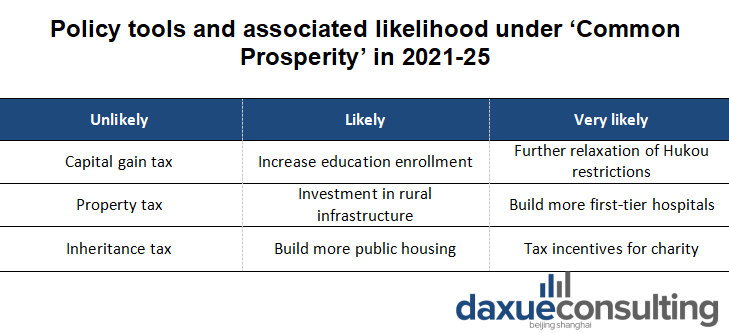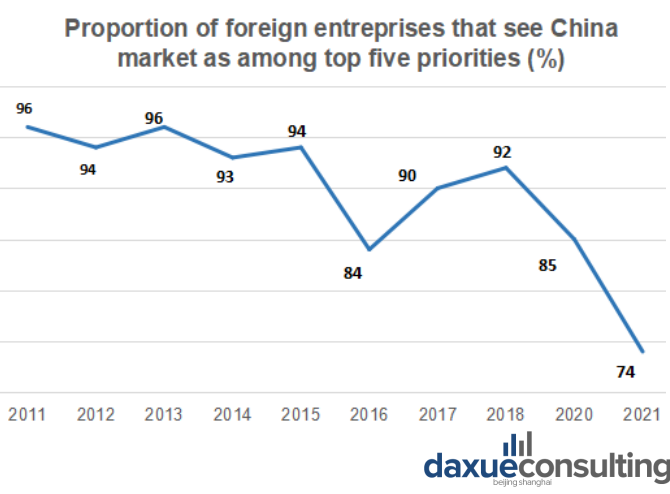In early 2021, Chinese President Xi Jinping made a speech emphasizing the importance of ‘Common Prosperity’, setting this concept as a tone in policy making for the next few years. As a policy-guided and increasingly modernized country, China’s ‘Common Prosperity’ campaign gathers momentum and impacts all aspects of society almost instantly. What’s China’s ‘Common Prosperity’ about and what’s its potential economic impacts? In this article we will step you through the essence of this policy initiative and analyze its effects on business in China.
What is China’s ‘Common Prosperity’ initiative?
‘Common prosperity’ is a political concept first proposed by Mao Zedong, founding father of what was then an impoverished country, with the aim to fully equalize the wealth held by all Chinese citizens. Now Chinese President Xi Jinping re-proposed this same concept, but with a slightly different meaning.
Whereas Mao’s policy initiative involved forcefully equalizing wealth to build a utopian society, this new policy initiative does involve to-some-extent wealth sharing, but more importantly, seeks to solve certain social issues and expand the size of middle income class in order to make China’s economic model sustainable. They have introduced a series of approaches, including setting stricter rules on gray income (income gained outside government’s scope of control), launching more inspections on undeclared earnings, and crackdown on monopolistic businesses, the most notable among all is ‘third distribution’, referring to creating opportunities for high-income groups and enterprises to give back to society, including through voluntary gifts and charitable donations.


Why now? China’s urgent social issues that ‘Common Prosperity’ hopes to address
- Wide wealth gap
- Unfair competition in businesses
- Lack of social mobility
- Lack of household consumption
What does China’s ‘Common Prosperity’ attempt to achieve?
- Balance the economic structure
- Boost social mobility
- Improve social welfare
- Reduce unfair competition
What policies will be implemented under China’s ‘Common Prosperity’ initiative in 2021-25?

Repercussions from society
As we all know, most major policies will face countless praises and sharp criticisms the first moment they come out. Naturally, China’s ‘Common Prosperity’ initiative is no exemption.
Daniel Zhang, Alibaba’s incumbent CEO, highly appreciates and proactively embraces this policy, saying that ‘It’s not about robbing the rich. It’s about restructuring the society, and building up a middle class.’ However, Ming Xia, a professor specializing in Chinese politics, comments in an opposite manner. He points out that realizing the goal of ‘Common Prosperity’ is no difference from a fantasy. It’s impossible to eliminate the differences of social status and geographical locations, which ultimately determine your wealth. Plus, this policy will discourage business from innovation as well.
How will China’s ‘Common Prosperity’ initiative navigate the future of business?
The luxury industry might suffer a temporary loss
China is among the world’s top consumers of luxury goods, such as Swiss watches, Italian ties and German luxury cars. According to a report by Global Times, China’s luxury good sales rose by a stunning 48% to about 350 billion yuan ($54 billion) in 2020 despite the initial fallout caused by the pandemic.
Riding on the trend, China’s luxury market is on course to be the world’s largest in the next few years, that is, if it’s not too hampered by China’s ‘Common Prosperity’ policy.
The policy, which calls for adjusting excessive income and redistributing the wealth will deliver a large blow on China’s luxury market. In the years to come, under such influence, there will be fewer top rich people who can splurge on expensive goods. Even though they have excessive money, they might not purchase luxury goods as before either, for fear of social criticisms, such as people believing that they don’t care about the well-being of others. We can clearly see the negative impacts on the luxury industry from the trend on the stock market, where share of Paris-listed Kering, owner of Gucci Brand, slumped by 17%, and share of Louis Vuitton and Hermes slid 13% and 8% respectively in the first week after the proposal of this policy.
Crisis and opportunities of the technology industry
The technology industry in China has experienced a rapid growth in the past few years, which is reflected by the fact that employees’ wage undergoes an average 9.5% annual growth, topping all industries, and number of internet users almost doubles the size in the past 10 year (2011-2020).
But the glory days seem to be coming to a close since the suspension of Ant Group’s IPO, followed by the fines of other technology conglomerates such as Baidu (search), Byte Dance (social media), JD (e-commerce) for various reasons including failing to disclose mergers, signing exclusive contracts and misleading market tactics. According to the State Administration of Market Regulation (SAMR), there will be stricter supervision and scrutiny on technology companies in the near future. They announced that there will be more probing into antitrust behavior, date security practice and poor working rights (notorious ‘996’ working culture).
In this sense, it’s safe to assume that under such a policy, the innovation and potential profitability of the technology industry will be hindered. However, each crisis entails opportunities. In such a winner-takes-all market, clampdown on technology giants definitely gives more room for small business to take roots and grow, which might eventually bring immeasurable benefits to future society.
How will China’s ‘Common Prosperity’ impact other industries?
The technology and luxury industries are the two main sectors that might experience the biggest shock from China’s ‘Common Prosperity’ policy initiative. But looking at the economy as an organic structure, the impact of this external pressure on other industries should not be ignored as well.
- Sports: Sports industries might undergo a significant boost under the government’s ‘Healthy China 2030’ campaign, combined with the increased public health awareness as a result of Covid-19 Pandemic.
- High-tech hardware: As the tension between US and China goes on, we can also expect increasing governmental support on the innovation of high-tech hardware, especially those related to semi-conductor industries.
- Service: As the middle income class continues to grow and people have extra money to spend, it’s likely that the demand for services industry, such as education, asset management and entertainment will face a prospective growth.
How should business make adaptations to China’s ‘Common Prosperity’ policy initiative?
The best adaptations that business can make are aligning their future business operating patterns with the core spirit of ‘Common prosperity’. Specifically, it means higher-ups will need to take better care of their employees, providing more benefits with reasonable working hours. Additionally, corporates should also take more social responsibility, among which, environmental outcomes, charitable donations and anti-monopoly behavior are all important considerations.
It’s also beneficial to learn from existing real-world examples. Tech-giant Tencent pledged 50 billion yuan for ‘Common Prosperity fund’, one day after President Xi Jinping announced ‘Common Prosperity’ as a key social and economic goal for China. According to their statement, they will use their digital and technological capabilities to provide assistance in several areas, including the development to rural regions, low-income groups, primary medical assistance and grass-root education. Similarly, Meituan is also riding on the trend as well. Wang Xing, Meituan’s CEO, recently published a post where he aligned Meituan’s name itself to ‘Common Prosperity’. In his post he said that ‘Mei’ means beautiful, ‘Tuan’ means together, and henceforth, the goal of ‘Common Prosperity’ is deeply embedded in Meituan’s genes.
Will China’s market perspective for foreign business still stay positive?
Since China’s ‘Common Prosperity’ policy initiative first came into public, there has been sweeping pessimism and demonization on international news media, conveying a sense that China is no longer a suitable place for business to even survive and that business will have no choice but to leave China market immediately. However, the reality is never how news media describe it to be. According to the 2021 member survey of US-China Business Council, while it’s true that China’s business climate is somewhat dampened compared to a decade ago because of geopolitical risks, trade tensions and global supply chain disruption, still roughly three quarters of foreign business think China is among the top five priorities to conduct business operations in.

In the future, foreign brands will still see China as a highly profitable market destination, but they also have to recognize the stricter regulatory environment and increased market uncertainty, and adjust market strategies accordingly.
Author: Jiachen Han





